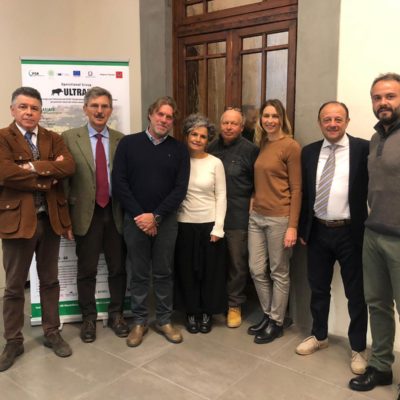Articolo disponibile anche in: Italian
Tuscany is second only to Austria when it comes to the size of its wild ungulate population: 400,000 according to the latest estimate.
Despite the fact that about 80,000 wild boars get killed every year, the issue has not been resolved, becoming an environmental, economic and public safety emergency.
It’s necessary to find a definitive and systemic solution, also taking alternative proposals into consideration. Ultrarep, the ultrasound technology that repels wild ungulates, may be an answer.
On Tuesday 19th November the project was presented during the conference promoted by E.R.A.T.A. (training agency of Confagricoltura Toscana) – “Ultrarep Project – Innovative systems of defence ULTRAsound Animal REPeller” to prevent damage to crops caused by wild ungulates.
This is a pilot project that aims to protect crops and forests, thanks to innovative technologies that are not harmful to animals and have a low environmental impact.
Launched as an experiment in Tuscany, it is funded by “Sostegno per l’attuazione dei Piani Strategici (PS) e la costituzione e gestione dei Gruppi Operativi (GO) del Partenariato Europeo per l’Innovazione in materia di produttività e sostenibilità dell’agricoltura (PEI-GO)” (“Support for the implementation of Strategic Plans (DPs) and the establishment and management of Operational Groups (GOs) of the European Innovation Partnership on agricultural productivity and sustainability” (PEI-GO)) year 2017.
A group of Tuscan farms are partners in this project: Barone Ricasoli Spa Agricola (leader), Società Agricola San Felice SpA, Azienda Agricola dell’Agnello Vilio, Azienda Agricola Meini Fabrizio.
Other partners collaborate such as: NATECH Srl, CNIT – Consorzio Nazionale interuniversitario per le Telecomunicazioni, Department of Earth and Environmental Science of the University of Pavia, WWF Arezzo Onlus, Foreste Casentinesi National Park, Monte Falterona and Campigna, E.R.A.T.A.(technical assistance and training agency of Confagricoltura Toscana).
This is the first experiment of its kind in Italy. Born of an intuition, it’s looking like it might become a possible solution.
“I installed some animal repellers in a garden, they were non-professional tools – says Massimiliano Biagi, agronomist and technical director of Barone Ricasoli Spa – but they worked. Hence the idea of building them on a large scale thanks to the collaboration with Natech srl, to propose an effective solution that doesn’t have an impact on the environment. They are also less expensive than other methods”.
They are quite a lot cheaper, if you consider that fences cost a good 18 euros per meter: “You don’t need to place many repellers – says Biagi – a few are enough, roughly one every 30 meters. They don’t have any impact on the land and, above all, don’t need maintenance”.
The experimentation involves three areas: hilly terrains for the vineyards, forests and plains for horticultural cultivations.
It’ll be possible to evaluate the first results and assess their effectiveness within a year.
“There’s no one single solution to this delicate and serious issue – commented the Regional Councillor for Agriculture, Marco Remaschi – We have been committed to dealing with it since the beginning of this legislature, carrying out larger selective culls, but we’re aware that we need to find other solutions”.
“With respect to this issue – concluded Remaschi – innovation and technology can surely offer other tools that can protect crops and create a virtuous circle for the companies. I also believe this trial is important not only for the wild ungulates, but also for the predators. We have to provide answers: the agricultural sector expects it. And with the Operating Groups and the help of innovative technologies we are confident we’ll be able to achieve our goals”.





